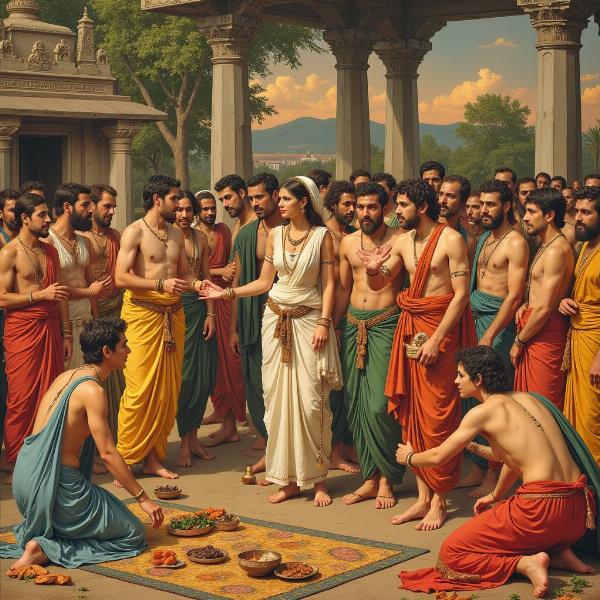The meaning of “ganika” in Hindi is a complex and often misunderstood topic. While often simply translated as “prostitute,” the term carries deeper cultural and historical connotations that are crucial to understanding its true meaning. This article will explore the various interpretations of “ganika” in Hindi, examining its historical context, social implications, and literary representations. We’ll delve into the nuances of this word and uncover its multifaceted meaning beyond a simple translation.
Exploring the Historical Context of “Ganika”
In ancient India, “ganika” referred to a class of highly skilled courtesans who were often educated in the arts, music, and literature. They held a distinct social position, enjoying a degree of autonomy and respect not afforded to ordinary women. Unlike common prostitutes, ganikas were known for their wit, charm, and artistic talents. They were often patrons of the arts and played a significant role in the cultural landscape of ancient India.
Social Implications and Perceptions of “Ganika”
The social perception of ganikas was complex and varied across different regions and time periods. While they enjoyed certain privileges, they were also subject to social stigma and discrimination. Their lives were often intertwined with the royal courts and wealthy merchants, yet they were excluded from mainstream society. This duality in their social standing makes understanding the term “ganika” crucial for comprehending the social fabric of ancient India.
 Social Status of Ganika
Social Status of Ganika
“Ganika” in Literature and Popular Culture
The portrayal of “ganika” in literature and popular culture further reveals the multifaceted nature of the term. From ancient Sanskrit texts to modern-day films, ganikas have been depicted as both alluring seductresses and wise, independent women. These varied representations highlight the evolving understanding and interpretation of the term “ganika” throughout history.
How was “Ganika” different from other terms for prostitutes?
“Ganika” differentiated itself from other terms for prostitutes due to the implied skills, education, and social standing associated with the term. They were not merely providers of sexual services but also accomplished artists and intellectuals.
The Evolving Meaning of “Ganika”
The meaning of “ganika” has evolved over time, influenced by changing social norms and cultural values. While the term still carries some negative connotations, there’s a growing recognition of the historical context and complexity of its meaning. Modern scholarship aims to reclaim the historical significance of “ganika,” moving beyond simplistic interpretations and acknowledging the multifaceted roles these women played in ancient Indian society.
Conclusion
The meaning of “ganika” in Hindi is far more nuanced than a simple translation. By understanding its historical context, social implications, and literary representations, we can appreciate the complex and multifaceted nature of this term. It’s essential to move beyond simplistic definitions and acknowledge the diverse roles ganikas played in ancient Indian society, recognizing their contributions to the arts, culture, and social landscape of their time.
FAQ
- What is the literal meaning of “ganika” in Hindi? While often translated as “prostitute,” “ganika” historically referred to a courtesan with artistic and intellectual skills.
- What was the social status of a ganika? Ganikas held a unique social position, enjoying some privileges but also facing social stigma.
- How were ganikas portrayed in literature? Their portrayal varied, from alluring seductresses to wise, independent women.
- Has the meaning of “ganika” changed over time? Yes, the meaning has evolved, influenced by changing social norms and cultural values.
- Why is it important to understand the historical context of “ganika”? Understanding the context allows for a more nuanced understanding of ancient Indian society and the roles women played.
- Were all ganikas highly educated? While many were educated in arts and literature, it wasn’t necessarily a universal trait.
- What is the modern interpretation of “ganika”? Modern interpretations aim to reclaim the historical significance of the term and move beyond simplistic definitions.
Meaning-Hindi.in is your trusted partner for professional Hindi translation services. We specialize in various translation domains, including Business & Commerce, Legal & Certified documents, Technical & User Manuals, Website & Localization, Educational & Academic materials, Express & Urgent translations, and Specialized Industry translations. We ensure accurate and culturally sensitive translations, bridging the language gap for your specific needs. Contact us today to discuss your translation requirements. Email: [email protected], Phone: +91 11-4502-7584. Meaning-Hindi.in is committed to delivering high-quality Hindi translations that meet your unique communication needs.